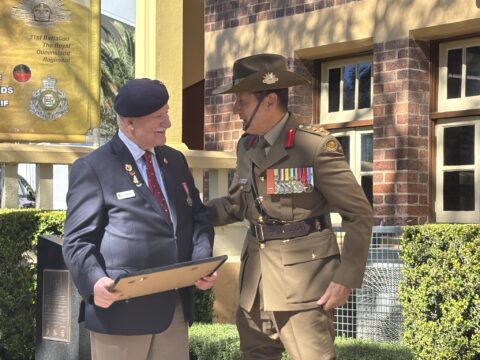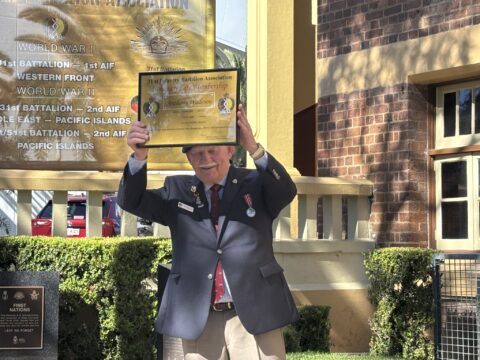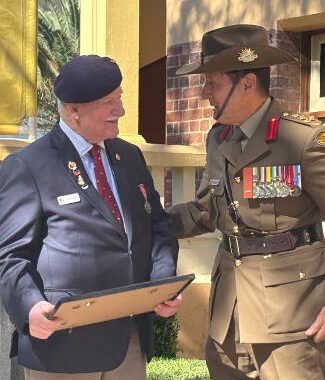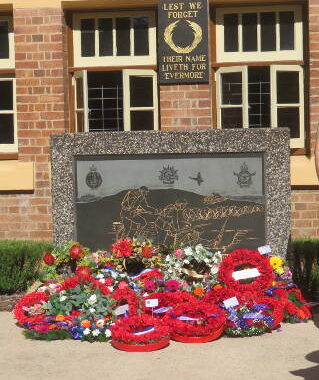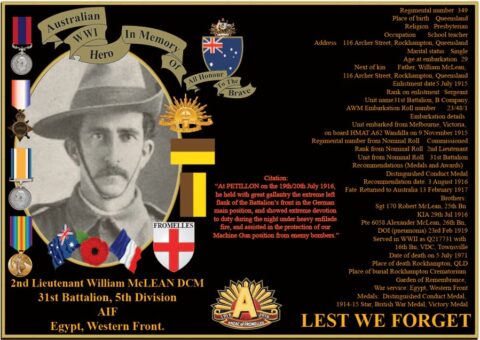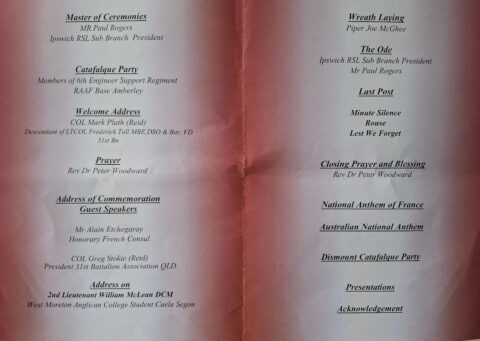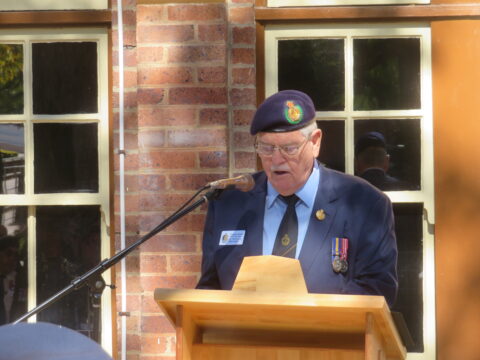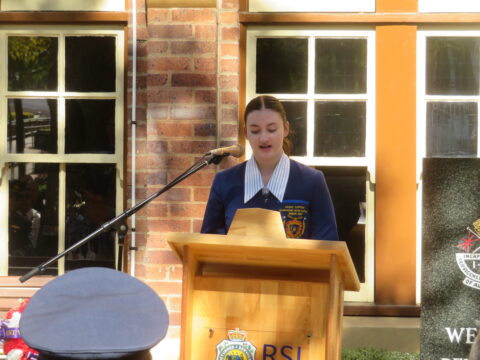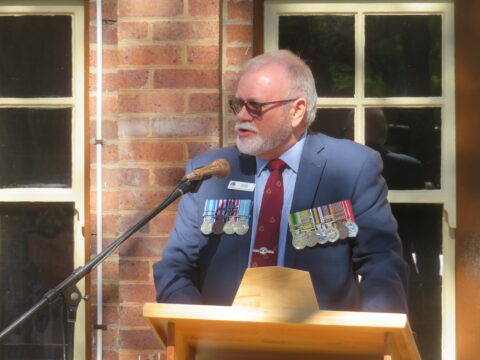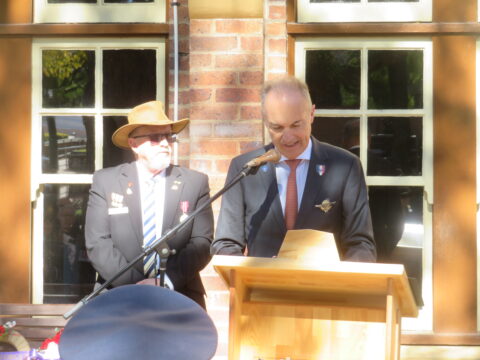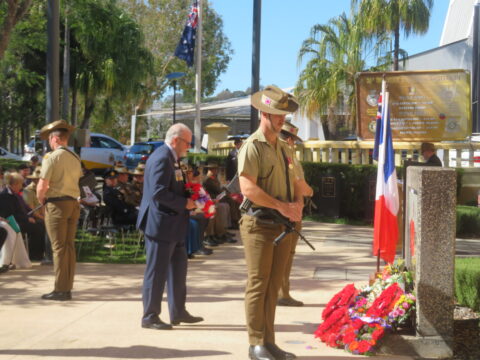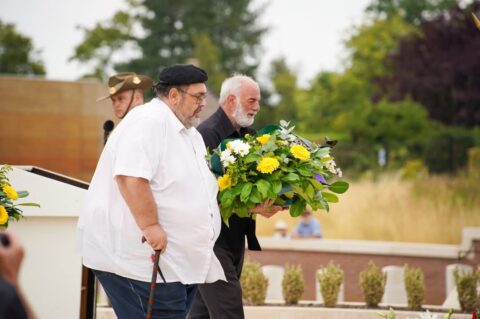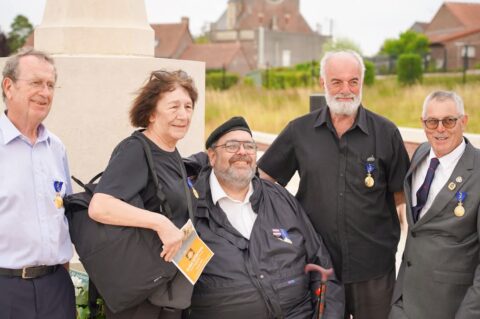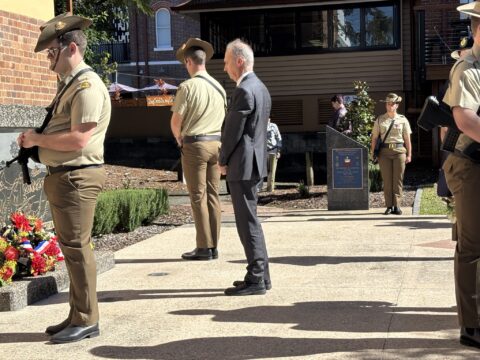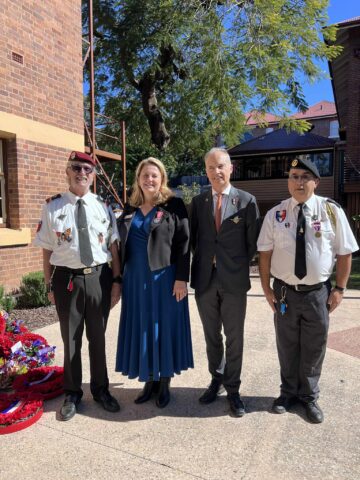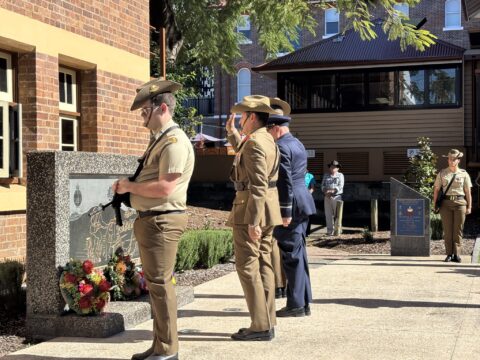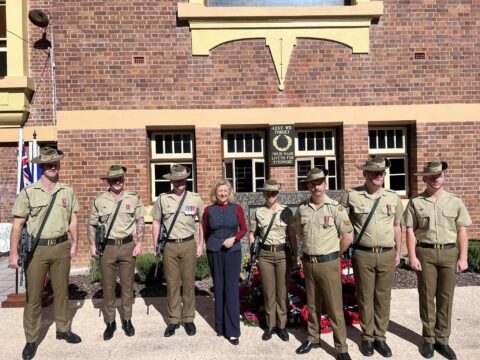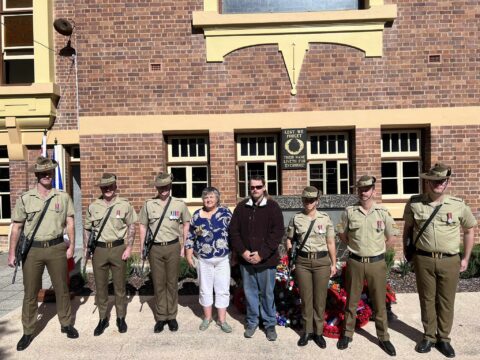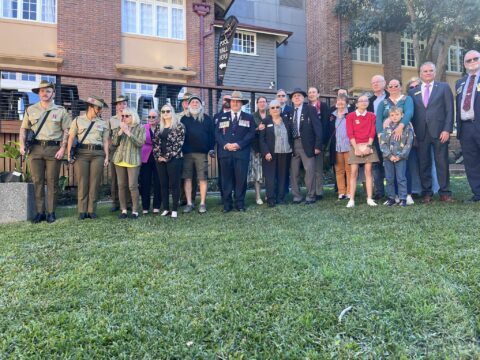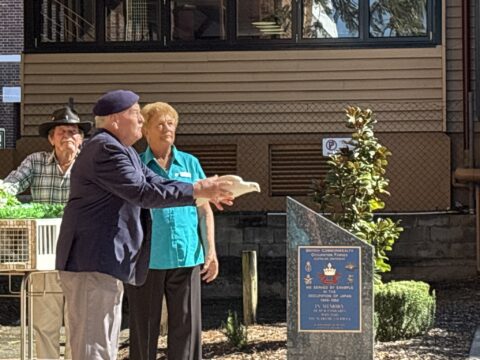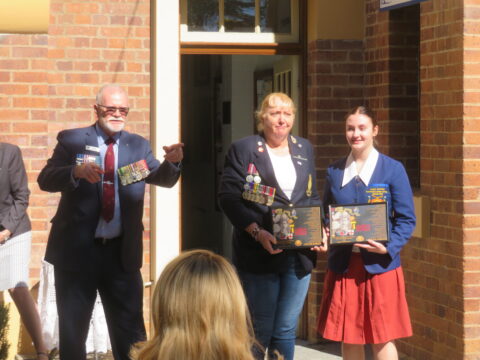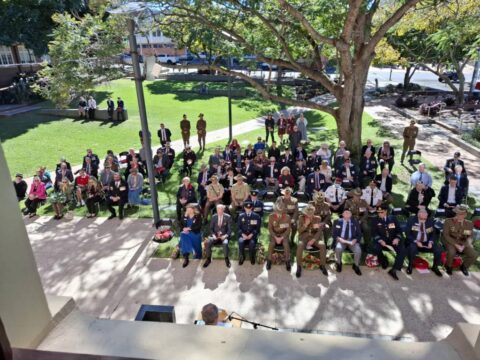Another highly successful Commemoration took place on the Anniversary Battle of Fromelles. It was held at the Honour Stone at the Soldiers Memorial Hall in the centre of Ipswich Queensland on Saturday 19th July 2025. The Battle which took place near Fromelles in Northern France in 1916 was the first battle involving Australian Formations on the Western Front after the reorganisation following the Gallipoli Campaign.
As in the past the Commemoration is sponsored by Ipswich RSL in conjunction with our own 31st Infantry Battalion Association. The President of the RSL Sub Branch Mr Paul Rogers who performed the functions of MC for the occasion was ably assisted by RSL Secretary Ms Debbie Wadwell.
The Catafalque Party was provided by members of the 6th Engineer Support Regt, RAAF Base Amberley. Their ceremonial drill provided an excellent background to the Commemoration.
The welcome address was provided by COL Mark Plath (Retd) who is a descendent of LTCOL Frederick Toll MBE, DSO & Bar VD. LTCOL Toll was the Commanding Officer of 31st Battalion at the Battle of Fromelles. COL Plath briefly spoke of his family links with the Battle. On a previous occasion he spoke in greater detail of his connection with LTCOL Toll and on battle itself (a link to that speech is under his picture below).
This was followed by the prayer and comments by the Padre, the Rev Dr Peter Woodward. His comments referred to the buildup of hostilities the flared up into WW1 and the comparison of the instabilities in our modern world.
A short address by he Honorary French Consul M Alain Etchegaray followed.
The first of the main addresses was presented by COL (Retd) Greg Stokie RFD President of 31st Battalion Association Qld. (His address is below).
There were a number of highlights including a Distinguished Guest List and an increased number of Descendants of those who fought in the Battle.
A particular highlight was the speech by West Moreton Anglican College student, Caela Segon, on 31st Battalion B Coy CSM (during the Battle) and later Lt William McLean DCM. (Her speech is also reproduced below).
Another touching and meaningful highlight was the release of Peace Doves at the end of the service by COL Greg Stokie (pictured below).
The order of Service continued with the laying of wreaths at the Honour Stone accompanied by the Piper, the reciting of the Ode, the playing of the Last Post and the National Anthems of France and of Australia.
At the end of the service Caela Segon along with all the Schools present, was presented with a Tribute Plaque of Lt William McLean created by our Honorary Member in France Pierre Seillier OAM.
–
We thank the Ipswich RSL sub branch and particularly President Paul & Secretary Debbie for their great assistance with this important Commemoration
–

Lt William McLean DCM – Especially Remembered at This Year’s Commemoration
One of the many Heroes of The Battle of Fromelles
William’s Distinguished Conduct Medal was for actions during the Battle and the citation reads –
“At PETILLON on the 19th/20th July 1916, he held with great gallantry the extreme left flank of the Battalion’s front in the German main position, and showed extreme devotion to duty during the night under heavy enfilade fire, and assisted in the protection of our Machine Gun position from enemy bombers.”

Order Of Service – Battle of Fromelles Commemoration.
–

COL Greg Stokie RFM Delivering his Address
–
Ipswich Address 19 July 25 by – COL Greg Stokie (Retd) – President 31st Bn Assoc
In 1918 they said it was the War to end all Wars as in Battles across Europe, millions were killed and maimed in probably the most violent conflict the World had ever seen. And here we are over 100 years later with ongoing conflicts in places such as the Ukraine, and the Middle East, and one has to ask whether the human race will ever move beyond war. I certainly hope we can but have my doubts.
WWII followed closely on the heels of the War to end all Wars and this year is the 80th Anniversary of the end of WWII, with both Victory in Europe and Victory in the Pacific Commemorations across the country. Perhaps we should take a moment to remember the courage and sacrifice of those who fought in WWII in Europe and the Pacific and paid the ultimate price, and the sacrifice of all those who fought, and their families at home.
But today we are here to commemorate the Battle of Fromelles and The Kennedy Regiment, initially the Third Queenslanders, later designated the 31st Battalion. The Regiment was proclaimed on 30 October 1886 and soldiers from The Kennedy Regiment have served in almost every military action in which Australia has been involved, ever since.
The 31st Battalion Association focuses its Commemoration each year on the Battle of Fromelles, a WWI Battle in France and the part in that action taken by the 1/31ST Battalion AIF.
Having commenced early evening on 19 July 1916, 109 years ago today, The Battle of Fromelles was over by 0800 on the next day. The 5th Australian Division suffered 5,533 casualties, rendering it incapable of offensive action for many months; the 61st British Division suffered 1,547. The German casualties were little more than 1,000. The 31st Battalion (The Kennedy Regiment) after having taken a section of the German trenches and hastily erecting improvised fortification against the inevitable German counter attack were driven back to the Allied lines suffering 572 casualties, over half of its strength. Although it still spent periods in the front line, the 31st played no major offensive role for the rest of the year. But they fought well and overran part of the German defences and held them, all be it briefly.
At the end of hostilities there remained a “lost army”. Along the thin ribbon of Europe that had been the Western Front, in 1919 there still lay unfound the remains of half a million soldiers. No family ever gives up hope that one day one of their loved ones will be found and returned to a marked war grave, along with a fitting Ceremony of Remembrance. Yet 3 years after signing the Armistice in 1918 the search for the missing was officially drawn to a close. Among those still missing were many Australians, a good number from the 31st Battalion.
Four Hundred and Ten unknown Australian soldiers killed in the Battle of Fromelles, (Bodies found on the Battle Field after the Ceasefire in 1918) were buried at the VC Corner Cemetery, 2 kilometres north-west of Fromelles. Still, many were missing, and a search was started early this century for an unmarked mass grave. The site was found near Fromelles at Pheasant Wood. The researchers believed that the pits (Behind the German Lines), had not been found after the war and gained support for an exploration of the site.
Subsequent exploration indicated that the pits had been undisturbed since the war and contained the remains of a large number of soldiers. Exhumation took place from May to September 2009, and 250 Bodies found. As of now the mortal remains of 180 of those Bodies, all Australians have been identified by DNA. – 114 from the 8th Brigade, some being 31st Battalion members, – 64 from the 14th Brigade and 2 from the 15th Brigade. They were moved to a new Commonwealth War Grave cemetery, built about 120 metres away at Pheasant Wood. A new museum was also constructed.
It was at this time that the 31st Battalion Association decided that it would be appropriate to commemorate the Battle of Fromelles where so many of their Battalion lost their lives including many from the Greater Ipswich area.
In the words of our Brisbane past, – Vice President Col Jackson, – “Perhaps we should reflect upon the valour and sacrifice of those who fought in the Battle of Fromelles, and the legacy of beliefs, traditions and customs which have grown out of the sacrifice of all those who fought, and especially those who died in the cause of freedom. We should also remember the citizens of Fromelles and surrounding villages and farms who had their lives torn apart by the war which descended upon them, and the friendship that they showed the Australian soldiers, far from their homes.”
One hundred and nine years later when places like Fromelles and Villers-Bretonnaux are mentioned, there is immediate recognition of the friendliness of people in France who have upheld the traditions of remembrance and have made visiting Australians so welcome for over a century. Like a great French friend of the 31st Association, Pierre Seiler, who places wreaths at the Pheasant Wood Cemetery each year on commemorative occasions. And of the late Madam Maree Paule Demassiet who allowed researchers to dig on her land, and donated the land for the new Pheasant Wood Cemetery.
Having visited Fromelles in 2016 for the 100th anniversary of the Battle, and felt that swell of pride as the Colours of the 31st were carried onto the parade, I became aware of the enormity of the tragedy which left so many of our Battalion dead, wounded or missing and began to understand why so many Australian Families now visit the WWI Battlefields in search of the graves of past relative, and so piece together their family history. And why recording Family History has become very important for many Australian Families.
Our battlefield guide in 2016 read out a poem by Michael Edwards which I think encapsulates the human tragedy which was the Western Front and the lot of many of the Soldiers of the 31st Battalion.
The Day My Family Came
I half awoke to a strange new calm
And a sleep that would not clear
For this was the sleep to cure all harm
And which frees us all from fear.
Shot had come from left and right
With shrapnel, shell and flame
And turned my sunlit days to night
Where now, none would call my name.
Years passed me by as I waited,
Missed the generations yet to come,
Sadly knew I would not be fated
To be a father, hold a son.
I heard again the sounds of war
When twenty years of sleep had gone,
For five long years, maybe more,
Till peace once more at last had come.
More years passed, new voices came,
The stones and trenches to explore,
But no-one ever called my name
So I wished and waited ever more.
Each time I thought, perhaps, perhaps,
Perhaps this time they might call me,
But they only called for other chaps,
No-one called to set me free.
Through years of lonely vigil kept,
To look for me they never came,
None searched or even wept,
Nobody stayed to speak my name.
Until that summer day I heard
Some voices soft and strained with tears,
Then I knew that they had come
To roll away those wasted years.
Their hearts felt out to hold me,
Made me whole like other men,
But they had come just me to see,
Drawing me back home with them.
Now I am at peace and free to roam
Where e’er my family speak my name,
That day my soul was called back home
For on that day my family came.
Thank you.
–
The following is the Speech by West Moreton Anglican College student, Caela Segon:

West Moreton Anglican College Student Caela Segon Presenting Her Speech
Good morning everyone,
Thank you all for being here today. It is an honour to stand before you on this solemn occasion, where we come together not only to remember a battle that left a deep and lasting scar on our nation’s history, but also to pay tribute to the life and legacy of a man who faced that horror with quiet strength and unwavering courage: Lieutenant William McLean.
The Battle of Fromelles, fought over two devastating days on the 19th and 20th of July 1916, marked the first major engagement for Australian troops on the Western Front during the First World War. It was designed as a diversionary attack, a strategic move intended to draw German forces away from the ongoing Battle of the Somme. However, what unfolded on that battlefield would come to be remembered as one of the most tragic and costly episodes in Australia’s military history.
In just over twenty-four hours, more than five and a half thousand Australian soldiers were killed, wounded, or taken prisoner. It was an event so brutal, so sudden, and so destructive that many of the men who entered the battlefield never had a chance to fire a shot. For thousands, it was their first experience of the Western Front. For far too many, it was also their last.
Among those men stood William McLean.
Born and raised in Rockhampton, Queensland, William was not a career soldier. Before the war, he was a schoolteacher—an ordinary Australian with a gift for leadership and a deep sense of duty. Like so many others, he left behind the familiar comfort of home and answered the call to serve, embarking from Melbourne aboard the HMAT Wandilla in November of 1915.
By the time the Battle of Fromelles came, William had risen to the rank of Company Sgt Major. On that nightmarish night, he led the extreme left flank of his battalion’s front line under unrelenting machine-gun fire. What he faced was nothing short of hell on Earth—mud thick as concrete, barbed wire tangled like claws, and shells that shook the very ground beneath their feet. Yet William remained steadfast. His leadership, his resolve, and his bravery in those impossible hours became a symbol of everything we remember today.
For his actions, William McLean was awarded the Distinguished Conduct Medal. It was not handed out lightly. This was a recognition reserved for men who showed exceptional courage and composure in the face of overwhelming adversity. But awards, as meaningful as they are, can only tell part of the story. Behind the medal is a man who made choices in impossible conditions. A man who led others while the world fell apart around them.
The cost of that night did not end when the guns fell silent. William was severely wounded shortly after the battle, struck by gunfire to the chest. He survived, but like so many who returned, he did so carrying injuries that went far beyond the physical. His recovery was long and painful, and the echoes of Fromelles would never fully leave him.
But William McLean’s story does not end there. He continued to serve his country in the decades that followed, offering his knowledge, his discipline, and his hard-won experience to a new generation during the Second World War. He lived a full life, passing away in 1971, but his presence remains. It can still be felt in the classrooms where he once taught, in the soldiers he helped to shape, and in the communities that still speak his name with pride.
As someone who grew up in a Defence family, today’s remembrance holds a special and personal significance for me. My parents, and my brother, like William, made the decision to serve their country. They chose a life that is not always understood from the outside—a life marked by duty, by sacrifice, and by the quiet burden of responsibility. Though the nature of that service may look different across time, the impact remains constant. I remember the long months of separation. The missed birthdays and Christmases. The ever-present awareness that our freedoms have been bought at a cost.
It is through stories like William’s that I have come to truly understand and appreciate the full weight of that sacrifice. It was not just the battlefields that demanded courage. It was the return home, the effort to rebuild, to live with memory, and to serve again. William McLean’s life is a testament to that quiet strength. A strength not just of muscle or command, but of character.
He, and so many like him, stepped forward into the unknown not because they lacked fear, but because they chose to act in spite of it. They believed in something greater than themselves. Whether it was loyalty to their mates, their families, or to the idea of a better future. Their legacy is not just etched into medals or written in the pages of history books. It lives on in the values we carry, in the freedoms we enjoy, and in the very fabric of our national identity.
So today, as we remember the Battle of Fromelles, let us honour not only the sacrifice, but also the spirit. Let us remember the individuals behind the statistics. The teachers, the farmers, the young boys and old souls who made the ultimate choice. Let us carry their stories forward, not just as names on a plaque or faces in a photo, but as guiding lights in how we live our lives, in how we treat each other, and in how we remember the past.
Lieutenant William McLean reminds us that heroism does not always look like the movies. Sometimes it looks like standing firm when every instinct says to run. Sometimes it looks like picking up the pieces after unimaginable loss and continuing to serve. Sometimes, it looks like a quiet teacher from Rockhampton who chose to make a difference.
May we honour that legacy—not just today, but every day.
Lest we forget.
–

COL Mark Plath – Welcoming Address
COL Plath delivered a fuller address on his Great-Uncle
LTCOL Frederick Toll MBE, DSO & Bar VD
At the 104th Commemoration of the Battle of Fromelles (Link Below)
Link Here
–

Honorary French Consul M. Alain Etchegaray
–

COL Plath Laying Wreath at the Honour Stone in Memory of LTCOL Toll
and the Fallen at the Battle of Fromelles
–

Laying of 31st Battalion Wreath at Fromelles, France by Honorary Member Pierre Seillier OAM
(nearest camera) and Lambis Englezos AM
The following link tells some of the story of
Lambis and his search for the missing soldiers of Fromelles
Link Here
–

After the Formalities at Fromelles in France
–

Wreath Laying in Ipswich by the Honorary Consul M. Alain Etchegaray
–

Ipswich Mayor Theresa Harding with Honorary French Consul M. Alain Etchegaray
Flanked by (Left)M. Frank Lamy President Veterans de l’Armee Francaise d’Australie and
(Right) M. Joseph Noune
–

Laying of Wreaths BRIG Bill Date and Air Vice Marshall Professor Hugh Bartholomuesz OAM RFD
–

Member for Ipswich Jennifer Howard MP with Catafalque Party
–

Members of the family of Sgt Cyril Kirby MM with Catafalque Party
–

Family Members of Soldiers of the Battle of Fromelles with Catafalque Party
–

COL Greg Stokie RFM releasing the first of the Peace Doves
For the Video of the Release of the Peace Doves
Link Here
–

Caela Segon being Presented with Tribute to Lt McLean DCM
Created by Honorary Member Pierre Seillier OAM
–

Overview of the Assembled Gathering at the 109th Fromelles Commemoration
